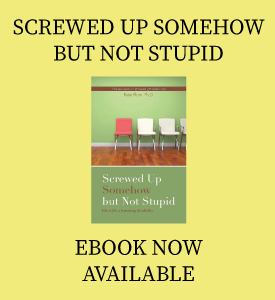When trying to find a good school for a child with learning disabilities (particularly NVLD), one decision is mainstream vs. special education. I talked about that in an earlier post: Drowning in the Mainstream. But another decision, particularly if you decide against special education, is the size of the school. Clearly, schools vary in size across a huge range, but we can talk, in general, about big schools and small schools. Then there’s the smallest school of all: Home school.
Each of these will be right for different children, or even for the same child at different ages. Here are my thoughts on the advantages and disadvantages of each.
Small schools are probably what comes first to mind when considering a placement. The advantages are fairly clear: Your child may receive more individual attention; a higher proportion of the staff will know your child well; any problems that arise may be identified more quickly. The disadvantages may be less obvious, at least to people who are not themselves LD or not expert in LD: That individual attention may also come from other children (and in not so welcome ways). In addition, especially in a small mainstream school, your child may become ‘the weird one’. There may be few (or no) other kids with similar issues. NLD children (and other children in the autism ballpark) often have unusual interests – in a small school, it will be less likely that other children share those interests.
Large schools have almost opposite advantages and disadvantages. If the school is not very well run (and, given the student-staff ratios at many schools, it is hard to run a school well) your child may fall between the cracks and be ignored. On the other hand, in a large student body there will be more children who are comparable to your child, both in terms of disabilities and interests.
Then there’s home school. I know relatively about this, but it seems to me to offer some unique advantages and disadvantages. The biggest advantages would be knowledge of your child and flexibility of program. The disadvantages (in addition to practical issues of cost and finding materials and instructors and so on) would, I think, be around finding friends.
None of these advantages and disadvantages are set in stone. There are good big schools that manage to track every child well; there are small schools that make huge efforts to find a cohort for each child; and homeschooling can work very well, as well.
How does this play out for choosing a place for your child?
I think that (again, in general) younger children (perhaps up to 4th or 5th grade or so) do better in smaller schools and the older your child gets, the more the advantages of larger places come up.
If your child’s issues are primarily social, a larger school (or home school) might be better. If they are primarily academic, a smaller school might be. If your child is good at self-advocating then some of the disadvantages of large schools will become less severe; similarly, if your child fits well into a well-known diagnosis, some of the problems of large schools are less. If your child has multiple issues, is twice exceptional, has very unusual interests, then a small school or home school might be best.
But, again, your mileage may vary. You know your child, I don’t.



Thank you Peter Flom from pointing out the advantages and disadvantages of various schools. What I have noticed by following the high school years of some of the students I had in elementary school is that for many who had problems fitting in and finding friends in our small community school when they were in a larger high school they thrived. In no time they found others who were interested in the same things they were. They joined extra activities at noon time or after school because there were some they liked to do unlike at the small school that only had lots of sports to please the majority. Still others liked to be a little fish in a big pond and navigate the corridors unnoticed; therefore, not bullied either!
Thanks for your comment, Lorna. I made the switch from small school to big one when I went to college and it was very good for me.